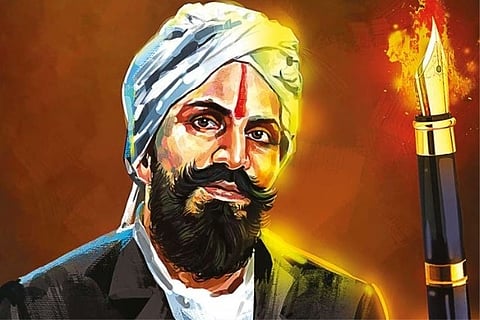

Chennai
None of his dreams, neither personal nor patriotic, had been realised. And as a poet, he was not well recognised as well and most of his poetry remained unpublished.
Only a dozen people attended the funeral of the poet who would later be called Desiya Kavi. But in history, some people start living only after their death. Sometimes even amplify their status becoming giants. It happened to Bharathi.
Bharathi was in exile in French Pondicherry for a decade and though there were some supportive families close to them, it took a great hit on his family morale. At one point, his wife Chellama built up the pressure by taking her children and going to her parents’ house giving him an ultimatum that he get back into British India. Finally, though knowing that he would be arrested, Bharathi exited Pondicherry. He was imprisoned for only three weeks in Capper Quarry jail in Cuddalore, for many seem to have intervened on his behalf, including Anne Besant, whom he had once ridiculed in his English parody — The fox with the golden tail.
Bharathi returned to Kadayam, his village, and when in 1920 a general amnesty was declared and his movements were no longer restricted, he decided to move to Madras. He came back in a third-class compartment, crowded and noisy. A group of passengers got into a fight with Bharathi and he spat on one of them. The man brought a policeman to arrest Bharathi but luckily the train guard recognised Bharathi and the issue was amicably solved.
Though they had decided to alight at Egmore, Bharathi’s brother Viswanathan was waiting at Saidapet station, having been informed by telegram presumably and requested them to stay with him. Bharathi went back to Swadesamitran paper where he was welcomed. From Saidapet, Bharathi travelled by train to George Town daily to carry out his editorial work at Errabalu Street.
A house in George Town, close to his office, was found but Bharathi felt it was too cramped. After a few places, they stayed in Vepery with Surendranath Arya (a preacher with the Danish mission) and his Swedish wife in a palatial bungalow. The couple lived in style and even had a butler, but Chellama came to realise he was a Harijan. While Bharathi didn’t mind it, Chellama felt queasy. Also, because he lived with Arya, rumours abounded in Bharathi’s circles that he had converted to Christianity for economic reasons.
Kuvalai Krishnan (Bharathi had once written a poem about him), his friend, came and pleaded that Bharathi takes up a residence in Triplicane. Thulasinga Perumal Street, having the rear door of the Parthasarathy temple, would host Bharathi in his last days. The family moved in a portion of a larger house with a courtyard. Not large but comfortable and costing a monthly rent of 12 rupees.
Bharathi earned an 80 rupees salary but would support an unemployed follower (engaging him as a jobless secretary for 18 rupees). But his constant wails of poverty inspired in Bharathi the famous poetics of ‘thani oruvanukku unavu illai enil...’ (let’s destroy this world even if a lone man goes hungry).
Occasionally in the mornings, Bharathi walked by the Parthasarathy temple. He would buy some fruits to feed the temple elephant. The poet and the pachyderm got to be excellent friends and he would refer to it as sahodara (brother) and even talk to it.
One day in July 1921, the elephant was in musth (a natural phenomenon in adult bull elephants) and its four legs had been chained and people were restrained from nearing it. But Bharathi did not care. When he approached the animal, it took the fruits and then knocked down the donor with its swishing trunk. Bharathi lay unconscious and bleeding between the four legs of the animal which luckily could not move.
Kuvalai Krishnan would jump into the enclosure, carry Bharathi on his shoulder having a constant eye on the trumpeting elephant. Bharathi was taken to the hospital, bleeding from a lip cut and concussions all over the body but was pronounced out of danger by the doctors.
Once healed, he started visiting the elephant again and the friendship resumed as if nothing had happened. He even wrote on the episode embellishing it with some imagination to make a short story called Kali koil yaanai. Bharathi had however weakened physically from the fall.
Around August of that year, he developed a stomachache but adamantly refused to take medicines. Bharathi breathed his last shortly after midnight on September 11 (hence the confusion of whether it was 11th or 12th).
They could not postpone the cremation for relatives to come, because the house was surrounded by very orthodox Brahmins. The friends pooled in money for the rites and a new dress. Harihara Sharma, a friend, bathed the poet’s body, clothed him in a new dress and prepared for the trip to the cremation ground and presumably lit the pyre too. Bharathi was carried to the funeral yard in a small procession of a dozen friends and fans. Surendra Nath Arya came to the house late and then rushed to the ground and gave an excellent elegy in Telugu — a fitting farewell!
It would take time before the poet, insignificant in his lifetime, encountered a wave of recognition. Years after he had left for his heavenly abode, the wave swept him to the pantheon of revered freedom fighters and poets.
-The writer is a historian and an author
Visit news.dtnext.in to explore our interactive epaper!
Download the DT Next app for more exciting features!
Click here for iOS
Click here for Android